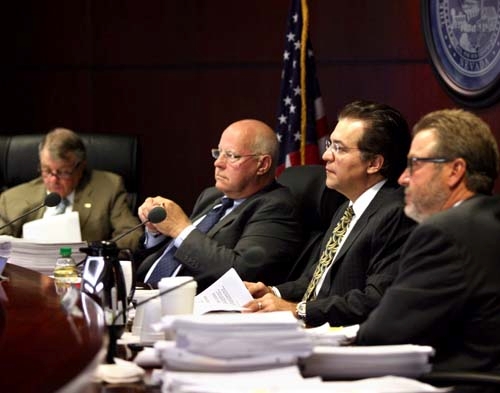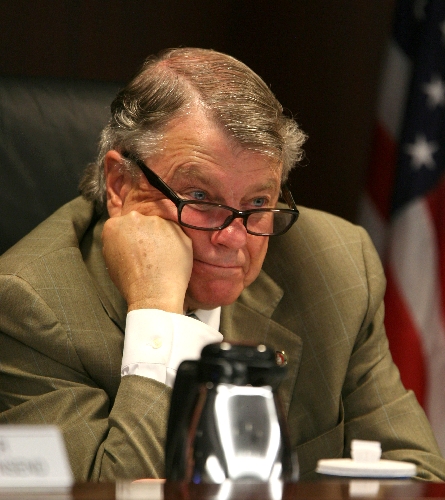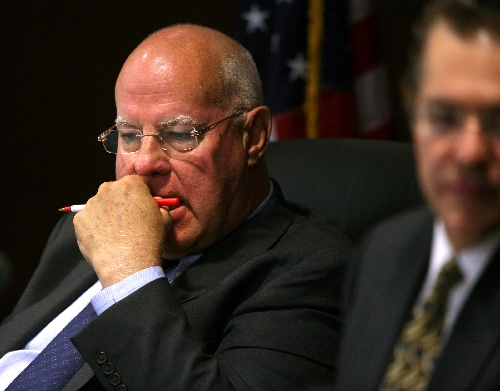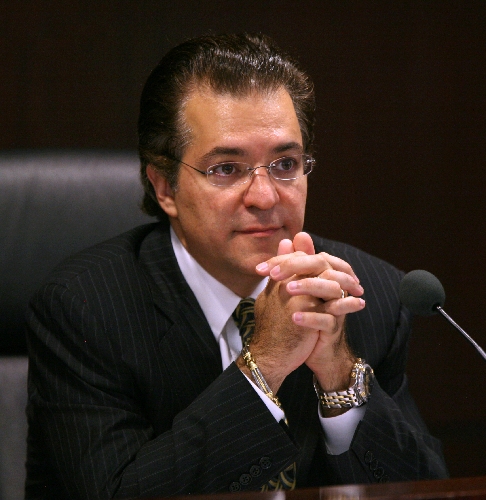Conflicts force gaming panelists to exit many votes
With little discussion or fanfare, the Nevada Gaming Commission unanimously approved a license for Mirage President Felix Rappaport as an officer in the Strip hotel-casino last month.
The matter was routine. Only the vote was unusual: All five gaming commissioners participated.
Commissioner Tony Alamo Jr., however, disclosed that he and Rappaport were "passive" investors in Henderson real estate. He still voted on the license.
"I don't believe the independence of judgment of a reasonable person in my position would be affected by this relationship," Alamo said.
By law, commissioners must not be "actively engaged" or have a "direct pecuniary interest in gaming activities." While no panel members work in gaming, longtime commission observers say the current makeup of the regulatory body may be skating close to the line.
The gaming commissioners -- three Las Vegas-area attorneys, a Las Vegas physician and a former state senator from Reno -- have in recent months declared more conflicts of interest than any in recent memory.
From May 2009 to July 2011, the number of conflicts have caused individual commissioners to recuse -- not participate in discussions or vote -- on more than 16 percent of about 1,260 agenda items. Countless times they have disclosed potential conflicts before voting.
Attorneys who regularly appear before the board say privately that the volume of recusals and declarations makes them "uncomfortable,'' but none contacted for this article were willing to comment on the record because they continue to represent clients before the panel. None questioned the integrity of the gaming commission.
REVIEWING ITEMS LARGE, SMALL
The part-time commission acts on recommendations made by the full-time Gaming Control Board, whose three members oversee Nevada's $10.6 billion-a-year gaming industry.
Gaming commissioners are appointed by the governor to four-year terms. The chairman is paid $55,000 a year; commissioners make $40,000.
The commission meets monthly to review thousands of pages of documents on nonrestricted items, involving large and small casinos, and restricted items related to bars, taverns, convenience stores and other locations with 15 slot machines or fewer. A typical meeting covers about 20 nonrestricted and 25 restricted matters.
The overwhelming number of recusals come from one commissioner, Las Vegas attorney Joe Brown, who has recused 175 times in 27 months on the panel. That means he took no part in about 14 percent of all commission matters.
John Moran Jr., another Las Vegas lawyer, finished a distant second with 16 recusals in those months, though several observers said Moran's total would equal Brown's if he used the same standards in deciding when to disclose a potential conflict.
Brown's conflicts primarily come from his role as the president of and stockholder in the statewide law firm Jones Vargas, which has a long list of gaming industry clients. Last month, for example, Brown sat out the discussion and votes on six nonrestricted items involving Jones Vargas clients.
"I personally do not work for them," Brown said at the meeting. "However, because I have a pecuniary interest in the firm and I'm a stockholder, I will recuse and not vote on those items."
Brown does not handle Jones Vargas client gaming matters, which are overseen by Reno attorney Michael Alonso.
"It has not affected the commission's ability to function," Gaming Commission Chairman Peter Bernhard said of the upswing in recusals. "It's important for the public to understand that a disclosure or abstention is part of the process. Just because there is a relationship doesn't mean the public isn't being served.''
Recusals have had little apparent impact on commission business. None have caused a deadlock, and there have been only three instances in which two commissioners recused on the same item, leaving a minimum quorum of three.
Only once in the 27 months did the commission even vote 3-1. In October 2010, Brown recused on Xpertx Inc., a Reno client of Jones Vargas seeking approval for an alternative funding source. Alamo voted no.
All commissioners participated in licensing applications for the $8.5 billion CityCenter development in 2009 and The Cosmopolitan of Las Vegas in 2010.
However, Brown sat out significant votes in the past nine months, such as bankruptcy reorganizations of Station Casinos and Herbst Gaming and a finding of suitability for a European online gaming company to partner with Caesars Entertainment Corp. All passed by 4-0 votes.
RECUSALS DON'T FAZE GOVERNOR
Outside experts said they aren't surprised that commissioners have conflicts of interest. The complexity of Nevada gaming law and regulations requires expertise in the subject, and lawyers with that knowledge come with conflicts.
"You want to avoid any appearance of impropriety, but you want to have people with practical experience," said Joe Kelly, a business law professor at Buffalo State College in New York, licensed Nevada attorney and associate with the Atlantic City-based Catania Consulting Group.
Those lawyers often come from major firms with many lawyers and multiple gaming clients, he noted.
New Jersey's Division of Gaming Enforcement and the Casino Control Commission were created as full-time boards to avoid those conflicts of interest.
"I would be concerned if Nevada had only one regulatory body," Kelly said. "Having the two-tiered system has minimized any potential problems."
Nor did Kelly fault Brown, saying 86 percent participation is still substantial.
I. Nelson Rose, a professor at Whittier Law School in California and a gaming law analyst, said the commission works as the Legislature intended, though he would be concerned about tie votes.
"It's not a rubber stamp, but it's in danger of being captive of the gaming industry," Rose said. "The control board has most of the power and does most of the work. But the commission does have the final say."
Gov. Brian Sandoval, himself a former commission chairman, said he's not concerned "because (recusals) are not affecting the commission's ability to conduct its business for the people of Nevada."
Sandoval said he prefers that a commissioner recuse or disclose a potential conflict rather than hide it.
"I think the commissioners are sensitive and concerned about the perception of the commission," said Sandoval, who left a law practice when he was chairman because a partner had gaming clients.
"I didn't want to be in the position of chairman and have to recuse on matters," Sandoval said.
He recalled that former Commissioner Art Marshall, who was replaced by Moran, disclosed numerous ties to the casino industry. Marshall's clothing stores, Marshall Russo, had several outlets in Strip resorts and he was chairman of BankWest of Nevada.
"We could all recite his disclosures by heart," Sandoval said.
Sandoval also has worked for Jones Vargas. He called Brown and Moran "great Nevadans who are committed to serving the state."
CONFLICTS EVALUATED
Gov. Jim Gibbons appointed Brown and Moran to the gaming commission, effective for the May 2009 meeting.
Gibbons placed Brown on the gaming commission when Brown's term on the Nevada Athletic Commission expired. Because the gaming commission is nonpolitical, Brown, who ran for lieutenant governor in 1986, was forced to resign as Republican national committeeman for Nevada.
Moran, the son of a former Clark County sheriff, has been chairman of Colorado River Commission and the Nevada Wildlife Board. He was first appointed to the gaming commission by Gov. Kenny Guinn in 2004, but left midterm to run for lieutenant governor.
The appointments were criticized at the time because they put four lawyers on the panel.
Brown said he discussed potential recusals with his Jones Vargas partners, with legal ethicists and with Gibbons.
"We were all concerned about it, and I told him I would never embarrass the state or embarrass myself," Brown said. "I don't ever want to be accused of having voted on something I should not have. If there is the slightest doubt, then I don't participate."
Brown said all Jones Vargas lawyers are sent commission agendas and asked to identify any potential conflicts.
"I double- and triple-check everything to make sure we do this the right way," Brown said.
Gibbons could not be reached for comment. Josh Hicks, a former chief of staff, said potential conflicts were evaluated.
"Joe assured us he would be vigilant," said Hicks, now a Reno attorney. "We knew there were going to be issues. The governor wanted Joe to err on the side of recusing if there was any question."
Bernhard, an attorney who has been the commission's chairman since 2001, called the number of recusals a "nonstory."
"I think Joe is more conservative on his recusals than he needs to be," Bernhard said. "It has not affected his ability to serve."
Moran discloses a conflict if a gaming applicant has been represented by his Las Vegas-based Moran Law Firm. In July he sat out three votes, including the licensing of Brian Arlin as an officer and key executive in the downtown casinos operated by Terry Caudill. He said his son, attorney J.T. Moran III, "did some preliminary legal work on that matter."
Moran also declared conflicts on two restricted locations involving slot machine route operator ETT. He didn't vote on a Terrible's convenience store on Blue Diamond Road, saying his son was "involved in some applications there at the local level."
However, Moran voted on the application for ETT at the Desert Food Mart on West Charleston Boulevard, "even though the law firm does some limited insurance defense work there."
"I don't personally represent this applicant on any matters whatsoever, gaming or nongaming," Moran said at the hearing. "I have no pecuniary interest in the matter. I don't believe as a result of that, that the independence of judgment of a reasonable person in my position would be affected."
VALUABLE DISCLOSURES
Bernhard, who was reappointed to a new four-year term as chairman in April by Sandoval, had six recusals in 27 months, third-highest of any commissioner.
He said a December 2008 Nevada Commission on Ethics advisory opinion guides disclosure. The opinion was sought by an attorney who sat on a public board and wanted to know whether he could vote on matters involving clients represented by other members of his firm. The ethics panel advised the attorney to disclose the relationship and "abstain from voting on such matters."
Ethics Commission Executive Director Caren Jenkins said she isn't concerned by the number of gaming commission recusals. She said public disclosure of relationships is important.
"The disclosures are worth their weight in gold," Jenkins said. "It's important that the public know where the allegiances lie. That's much more valuable than just any abstention."
Jenkins said she isn't surprised by disclosures from Brown or Moran.
"When you have an equity partner with a large firm sitting on a public body, the appointing authority has to be aware of the potential conflicts," Jenkins said. "That matter must have been weighed, and the decision was made that his contribution to the panel was more valuable than the conflicts."
Terms of all five gaming commission members will expire during Sandoval's current term -- Alamo's in April; Brown and Moran's in 2013; former state Sen. Randolph Townsend's in 2014.
Sandoval said recusal and disclosure matters could be part of the appointment evaluation process.
NO FAILURES TO REACH QUORUM
The commissioners with the fewest recusals in the past 27 months, Alamo and Townsend, said they aren't concerned about the issue.
"Frankly, until you brought it to my attention, I never thought about the hard numbers," said Alamo, a physician whose father, Tony Alamo Sr., is a retired Strip gaming executive. "We've never had a quorum issue and we've never had a hiccup in my time on the commission."
Alamo recused four times in the last 27 months. Two issues involved his long relationship with the Ensign family, which part-owned the Mandalay Resort Group, where his father was a top manager.
Townsend has recused just once, sitting out a May 2010 vote on licensing Carol Thompson as a key employee of Texas Station. Brown, whose firm represents Station Casinos, also recused.
Townsend, a veteran Nevada politician, is a partner in a holding company that acquires small businesses -- but avoids gaming and technology firms.
"The commission requires a very unique skill set and you have people that go back 40 years or so both personally and in business," Townsend said. "You're bound to see a conflict come up. The flip side is that you don't want someone on this panel who doesn't understand the industry and doesn't bring the proper experience to the table.
"I don't see this as a big issue."
Contact reporter Howard Stutz at hstutz@reviewjournal.com or 702-477-3871. Follow @howardstutz on Twitter.































